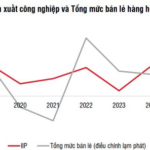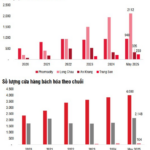The government has issued Decree No. 117 on tax management for e-commerce and digital platform businesses operated by households and individuals, effective from July 1st. According to the decree, e-commerce platforms and digital platforms must withhold and pay value-added tax (VAT) and personal income tax on behalf of the sellers (households and individual businesses) on the platform. The sellers include resident and non-resident individuals in the country.
These taxes will be withheld as soon as the order is successfully confirmed and the buyer accepts the payment. The tax amount is determined by a percentage of the revenue from each completed transaction. For example, VAT for goods with a 1% rate, services at 5%, and transportation and services attached to goods at 3%.

E-commerce platforms will pay taxes on behalf of online sellers from July 1st. (Illustrative image)
As for personal income tax, resident individuals in the country are subject to a tax rate of 0.5% for goods, 2% for services, and 1.5% for transportation and services attached to goods. Non-resident individuals are subject to a personal income tax rate of 1% for goods sold on online platforms, 5% for services, and 2% for transportation and services attached to goods.
In cases where the online platform management unit cannot determine whether a transaction is for goods or services, the tax withholding rate will be based on the highest applicable rate. Tax declaration for these platforms is done on a monthly basis.
For canceled transactions or returned goods, the e-commerce platform management organization shall offset the tax already withheld and paid on behalf of the canceled or returned transactions with the tax to be withheld and paid on behalf of the transactions for the sale of goods and provision of services.
The tax amount to be paid by the e-commerce platform management organization is determined by the total tax of the transactions for the sale of goods and provision of services after offsetting with the total tax of the canceled or returned transactions of the households and individuals.
The decree stipulates that households and residents engaging in business activities on e-commerce platforms are responsible for declaring and paying special consumption tax, environmental protection tax, resource tax, and other amounts payable to the state budget as regulated by tax laws, tax administration laws, and other relevant legal documents.
Individuals doing business on online sales platforms are also responsible for providing complete and accurate information such as tax codes or personal identification numbers, and passports to the platforms.
The Ultimate Guide to Understanding Business Taxes: Unraveling the Mystery of Tax Types for the Savvy Entrepreneur
From June 1st, 2025, tens of thousands of businesses with an annual turnover of over VND 1 billion will transition from a flat-rate tax to a declaration of actual revenue. This shift not only demands investment in technology and bookkeeping but also brings clarity to the taxes payable as per regulations.
Unveiling the Beneficiaries: Securities Firms Highlight Businesses Set to Thrive from Crackdown on Counterfeit Goods and Tax Regulation Enforcement
SSI Research predicts a more level playing field for modern retail businesses, with a shift away from intense price competition.
Counterfeiting in the Digital Age: Time to Take Action Against Online Marketplaces
“It is imperative to strengthen the penalties and impose criminal liability on both the manufacturers and the e-commerce platforms themselves if they are found to be in breach of regulations. A stringent enforcement approach is necessary to deter future violations and ensure a safe and trustworthy digital marketplace for all stakeholders involved.”





















